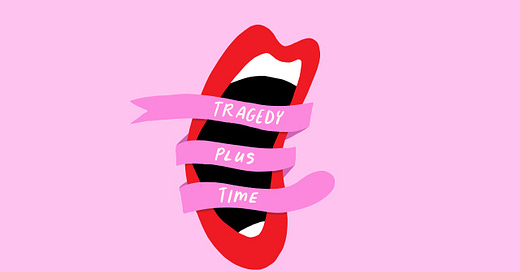The first writing session could not have gone better this past Sunday. After the paywall, there’s a link to the recording, a recap of the best comments about we’ve learned in therapy, and the brainstorming prompts and writing exercises.
The next 90-minute writing session will be Sunday, July 6th, 4-5:30pm ET, and it will be BE HYSTERICAL: On Voice and Emotion.
Has anyone ever called you “too much”? Have you ever been accused of being “dramatic”? Good. We’ll use that. Because to write, “too much” is exactly enough, and our emotion is a writing skill. In 90 minutes, we’ll cover how to use elements of style to sound like you in your writing, and we’ll cover every emotion and how to use each one in writing to make readers understand you or fear you. We’ll also practice making an extremely big scene whenever someone says, “Don’t make a scene.”
I don’t have time for segues. Here’s an excerpt from my book HYSTERICAL about “expressive writing,” which we did on Sunday.
…to get out of my mind what had manifested in my body by using my voice.
[My therapist’s] recommendation was a version of “expressive writing,” psychologist James Pennebaker’s psychological remedy for pain and his theory that writing one’s wounds helps close them.
Pennebaker asked his introductory psychology students to think about the darkest shit that had ever happened to them, then he divided them into three groups and instructed them to sit alone for fifteen minutes four days in a row and open a vein to write (like a personal essay class but for science).
One group wrote about current life events (minimum emotional voltage), another group detailed their very bad memory (medium emotional voltage), and group three recounted the dark shit and how they felt about it and the lifelong impact (maximum emotional voltage).
Prior to the experiment the students were asked about their medical histories, and they disclosed “major and minor health problems: cancer, high blood pressure, ulcers, flu, headaches, and earaches”; in Pennebaker’s results, students who wrote with maximum emotional voltage experienced “a 50 percent drop in doctor visits.”
In repeated studies based on the same protocol, the results were the same: “improved health” from writing “correlated with improved immune function.”
“In most studies of emotional-awareness and expression therapy,” writes science journalist Eleanor Cummins in “Is the Pain All in My Head?,” sick people “reported a significant reduction in their pain,” around “20 percent,” which is “on par with just about every pain-management tool including opioids, antidepressant and anti-seizure medications, meditation and mindfulness therapies, massage and physical therapy, and more.”
Dr. Sarno also observed in his patients “a desire for conscious unification of thought and feeling,” and once achieved, their physical pain faded. After “exorcising a diary’s worth of negative feelings over four months,” Juno DeMelo writes in her Times op-ed about Dr. Sarno’s method, “I was—in spite of my incredulousness—cured” of chronic pain in her left piriformis. DeMelo admits, “Dr. Sarno almost certainly oversimplified and overemphasized the psychological origins of pain. But he also helped me see that both the mind and the body are responsible for our physical suffering. And that we’re not powerless to change it.”
For angry women in particular, Soraya Chemaly found studies showing that “even remembering an angry experience results in a decline in antibodies, the first line of defense in fending off disease,” and “the survival rate for women with breast cancer who expressed their anger was twice that of women who kept their anger to themselves.”
Though not documented, expressive writing must work miracles for women in general, who historically had to disguise their anger and their writing in private journals or letters, or as postscripts or parodies or fiction or ghost stories, because their language was too twisted and depressing, and it was misconstrued as madness; so, for women, writing is a refusal to disappear. It’s a means to—how do I put this?—give birth to oneself. To be the subject for once.
Sunday’s writing session was basically an advertisement for therapy. And for TikTok. I shared what I’ve learned on TikTok that I count as therapy:
Anger is the first sign of your liberation.
Trauma is stuck emotion.
Let go, or be dragged.
Don’t shrink to be seen.
It broke my heart, but it fixed my vision.
Trust patterns, not potential.
Believe actions over words.
It doesn’t matter where you are in life; it matters what you believe about yourself.
Forget how you feel about them; how do they make you feel?
You are not here to babysit your conversations.
You are not here to be “normal.”
Everyone else shared enough of what they’ve learned in actual therapy to get us all through the rest of this year:
Keep reading with a 7-day free trial
Subscribe to Tragedy Plus Time to keep reading this post and get 7 days of free access to the full post archives.




